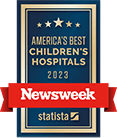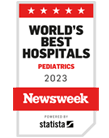
Ryland enjoys coloring on his iPad and listening to music. Due to his age, he’s not eligible for the vaccine so his parents rely on others to help protect their son by distancing, and if possible, getting vaccinated and wearing a mask.
As of today, 4,400 children in the U.S. have been diagnosed with COVID-19-associated multisystem inflammatory syndrome in children (MIS-C). While numbers help us gauge the spread and severity of COVID-19, they don’t tell the whole story of how this virus impacts patients, especially the most vulnerable.
After suffering a severe brain injury at birth, Ryland Wade (7) has required constant care from his family and providers at Akron Children’s to manage and treat dozens of medical conditions and complications due to his birth injury. While he is happy, bright and funny, he is unable to protect himself from COVID-19 in traditional ways like masking and vaccination due to his age and medical conditions.
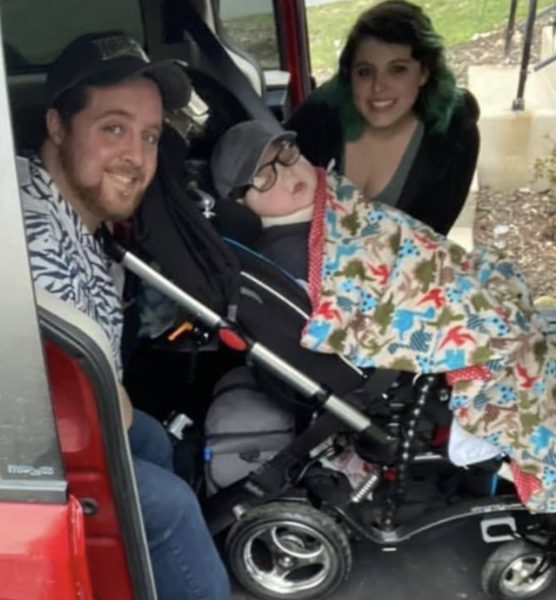
A typical day for Ryland requires hands-on care from his parents, Josh and Samantha. They assist with everything – from stretching and feeding him to transferring him to and from furniture, medical equipment and multiple medical appointments. (Photo taken pre-pandemic)
Ryland’s parents have always been careful and meticulous with his care, and became extra vigilant when the COVID-19 virus surfaced in 2020. They washed, sanitized, distanced, masked, cutoff all forms of in-person gatherings and even passed on things Ryland loves most like going to school in an effort to protect their son.
Despite their best efforts, in April 2021, the virus found Ryland.
“We have no idea when, where or how he could have contracted COVID-19 because he was asymptomatic,” said Josh Wade, Ryland’s dad. “He began having respiratory complications after a routine tonsillectomy…and tested positive for COVID antibodies.”
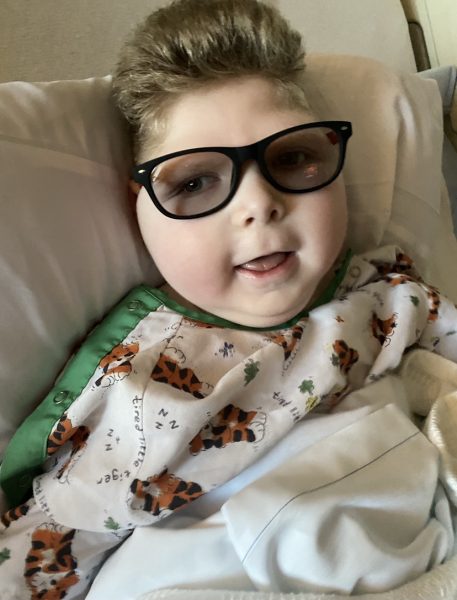
Ryland is no stranger to Akron Children’s. His care plan requires regular physical, occupational and speech therapy, as well as check-ups with dozens of specialists, such as epileptology, ophthalmology and urology.
The rest of Ryland’s story is a scary reality of what this virus is capable of. And, as more contagious strands like the Delta variant spread, his story is a reminder that we need to do what we can to protect one another, especially those under 12 who aren’t eligible for the vaccine.
“We were expecting to go home a couple days after his procedure, but we ended up at the hospital for 48 days, 35 of which were spent in the intensive care unit, and he was intubated for 25 of those days,” said Josh.
Soon after his surgery, Ryland’s breathing became labored, his oxygen levels began to drop and test results showed he was in kidney failure. He was transferred to the PICU where his oxygen levels kept dropping, he was seizing and his body continued to show signs of distress including liver failure, high fever, high blood pressure, fluid retention and a lung hemorrhage.
“We continued seeing blood in his intubation tube and in his secretions from his mouth and nose so he received a bronchoscopy and lung wash to try to find the source of the bleeding,” said Samantha Wade, Ryland’s mom. “We were told the risks of lung biopsy surgery could be catastrophic, but we had to try to find an answer or risk the hemorrhage worsening and multiple extubation attempts.”
After a month of life-saving care, monitoring and weaning off of medications and equipment, Ryland was able to go home. His lung biopsy concluded that acute fibrinous and organizing pneumonia was the cause of his persistent lung hemorrhage and that his COVID-19 infection was likely what brought it on.
“The trauma was extremely hard on all of us…We were left wondering if Ryland was going to survive this illness more than once during his admission. No parent should ever have to have those thoughts, and no child should ever have to go through what he did,” said Samantha. “We need to protect each other, especially more vulnerable individuals like Ryland. If something as simple as wearing a mask or social distancing can prevent what happened to Ryland from happening to someone else, or potentially save someone’s life, isn’t that worth it?”
For additional questions or concerns about COVID-19 or MIS-C, contact your child’s provider. Telehealth visits are now available.
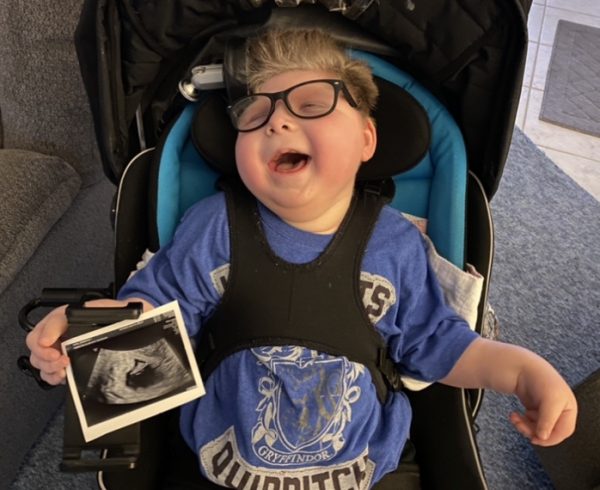
Today Ryland is back home and excited to become a big brother. His baby sister will be arriving this fall! His parents are his biggest advocates and support the CDC’s advice that vaccination among eligible populations is critical to stopping the spread of COVID-19, especially to children under the age of 12 who are not yet eligible for vaccination.







